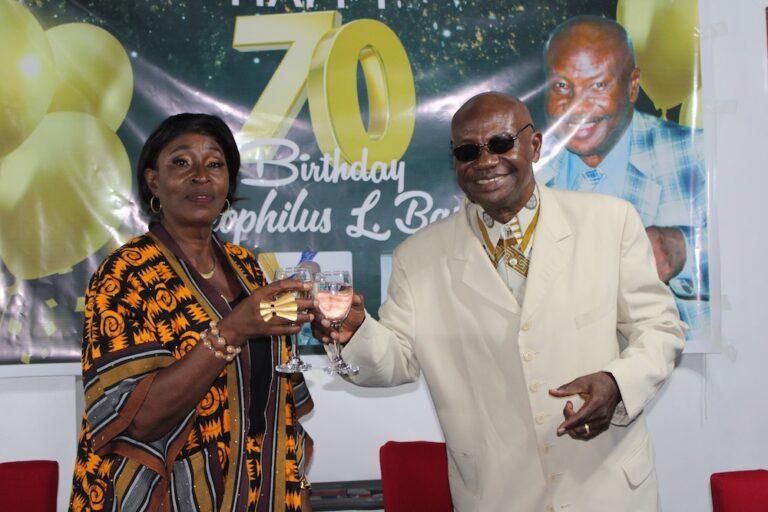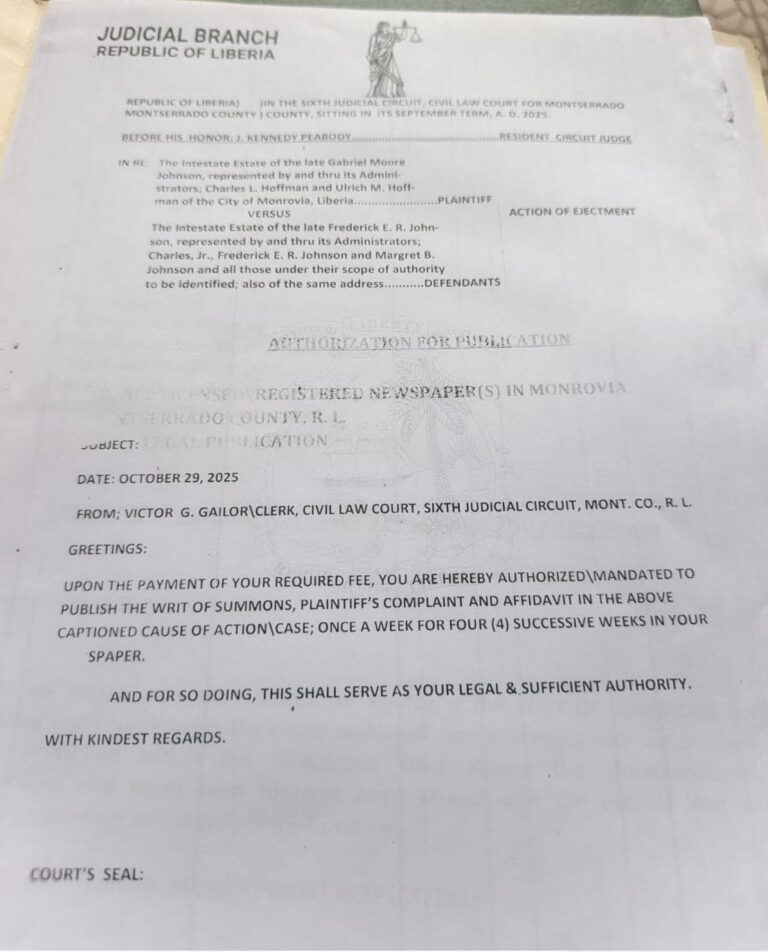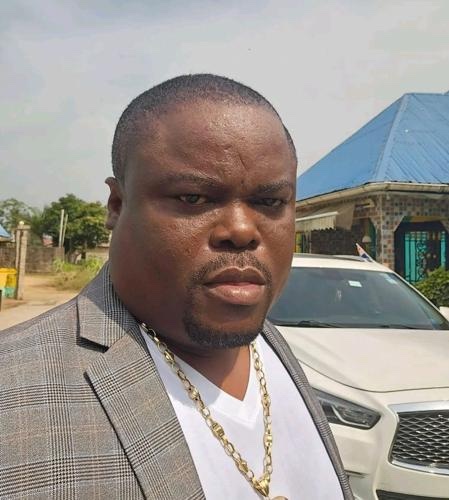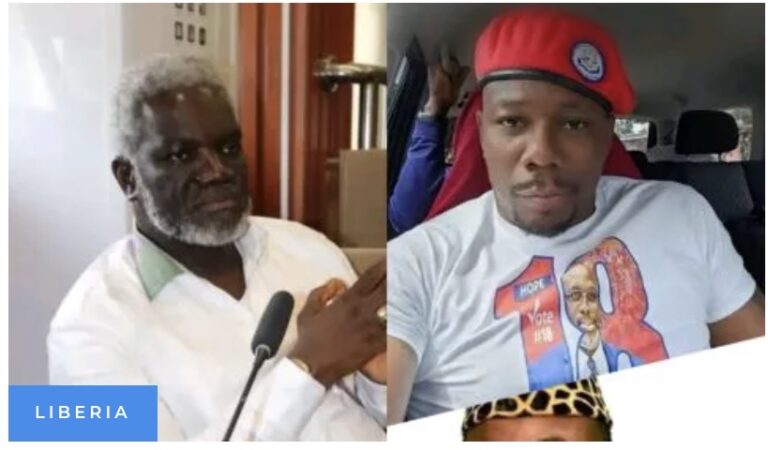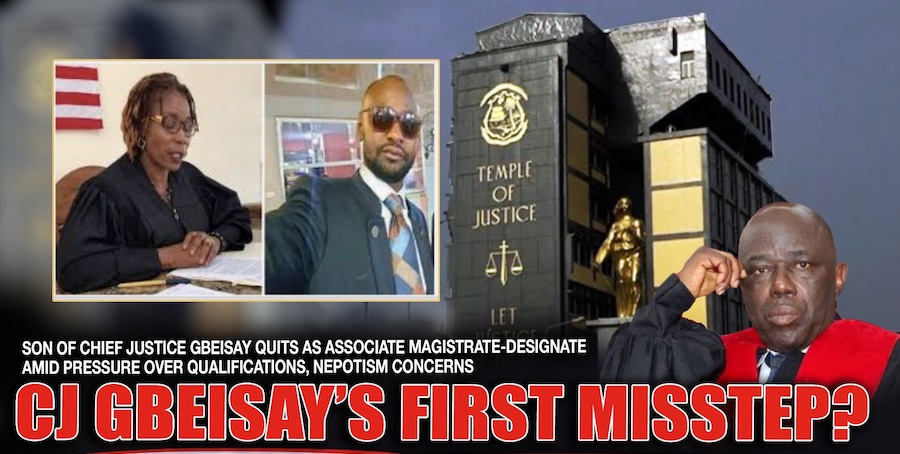
Monrovia — Willeyon Y. Gbeisay, the son of Liberia’s Chief Justice Yarmie Quiqui Gbeisay, has officially stepped down from his position as Associate Magistrate-Designate of the Paynesville Magisterial Court.
His resignation follows growing public criticism over his qualifications and a mounting outcry from legal practitioners and civil society groups who cited concerns over nepotism, judicial credibility, and procedural irregularities.
The Executive Mansion confirmed the resignation on Wednesday in an official statement, revealing that President Joseph Boakai has accepted Willeyon Gbeisay’s decision to withdraw from the appointment.
In his letter to the President, Mr. Gbeisay expressed appreciation for the nomination but noted that he wished to focus on completing his legal education at the Louis Arthur Grimes School of Law. He clarified that his resignation was made in good faith to prevent any public misconceptions and to avoid becoming a distraction to the broader reform efforts currently underway within the Judiciary.
In response, President Boakai thanked Mr. Gbeisay for his maturity and applauded his decision, which he described as a commendable demonstration of commitment to personal and professional development. The president’s acceptance of the resignation has been interpreted by some as a strategic move to preserve the integrity of his administration amid increasing scrutiny of political appointments under his leadership.
The controversy surrounding Willeyon Gbeisay’s appointment erupted shortly after the announcement was made public. Critics were quick to raise red flags over the fact that the nominee is still a third-year law student and has yet to obtain a law degree or graduate from the James A.A. Pierre Judicial Institute — Liberia’s statutory training facility for magistrates.
Legal experts and judicial advocates questioned how such an appointment could align with the principles of meritocracy, professionalism, and the rule of law.
In defense of the appointment, Chief Justice Yarmie Quiqui Gbeisay publicly addressed the criticism during a speech in Lofa County. He vehemently rejected allegations of nepotism, maintaining that both his recommendation and the President’s appointment were within the bounds of the law. According to the Chief Justice, the Liberian law mandates only stipendiary magistrates to be law school graduates and is silent on qualifications for associate magistrates.
“My son is a Liberian, he’s in law school, and the president faithfully appointed him. I do not see anything wrong with that. If you show me any law that says the president cannot appoint a non-lawyer as associate magistrate, I will resign my position today,” Chief Justice Gbeisay stated emphatically.
He further explained, “My son is a Liberian. He is in the law school and I nominated him to the president. When the president see fit to appoint him, I do not see anything wrong with that. The President is not wrong. He has not violated a law and I cannot advise him. Beside that we have high school graduates that are magistrates and on government payroll. The fact that we hire trained college graduates to be associate magistrates because we cannot afford to get lawyers now did not take the power from the president to appoint associate magistrates. And since the law did not say that they must be law school graduates, he has the authority. That’s my interpretation of the law. Appointing law school student as associate magistrates has a precedent in this country.”
Despite this defense, the National Association of Trial Judges of Liberia (NATJL) issued a strongly worded letter to President Boakai expressing serious concern. Signed by NATJL President Judge Nancy F. Sammy, the letter warned that appointing individuals to judicial offices without going through the required legal training undermines the institutional credibility of the judiciary and threatens judicial independence.
“If appointments can bypass the legal recruitment and training process, what becomes of the necessity and credibility of the Law School and the Judicial Institute?” Judge Sammy queried. “Such a practice risks discouraging merit-based advancement and opens the door for political influence to overshadow judicial independence.”
The letter also questioned the integrity of the broader appointment process, referencing at least six other presidential appointees seated as associate magistrates in counties such as Bomi, Lofa, Grand Bassa, Nimba, and Gbarpolu without having graduated from the Judicial Institute. The judges’ association noted that many of their own members had undergone “rigorous recruitment and training” and are being sidelined in favor of unqualified but politically connected individuals.
In response, Chief Justice Gbeisay accused some judges of misinterpreting the law and misunderstanding basic legal concepts. He argued that since the law is silent on specific qualifications for associate magistrates, the president retains full discretion to make such appointments.
“The constitution gives the president power to appoint all presidential appointees. When it comes to associate magistrates, the law is silent. What the law does not give, it holds — meaning the president retains the authority,” he said. “I have done nothing wrong. The president has done nothing wrong. My son, as a Liberian, is entitled to a job.”
Chief Justice Gbeisay also turned the spotlight on his critics. He pointed out that Judge Sammy herself may not be in the best position to raise concerns over nepotism, revealing that her husband works with the Ministry of Finance & Development Planning and her brother-in-law is a member of the Governance Commission.
Justice Gbeisay stated, “If the question is ‘Why Gbeisay is the Chief Justice and his son is also serving in the government?’, then I’ll refer you to yourself. They say one who lives in a glass house cannot throw stones. If you show one finger to somebody, four are showing to you. Resident Judge, your husband is Assistant Minister for Taxation, his brother is a member of the Good Governance Commission so if you say Gbeisay’s son cannot serve, then you resign.”
The controversy sparked nationwide debate and is being widely viewed as an early test of President Boakai’s ARREST Agenda — a policy framework focusing on accountability, reform, rule of law, education, sanitation, and tourism. Many see the resignation as a defining moment for the credibility of judicial reform efforts and the administration’s commitment to transparency and fairness.
Public reactions have been diverse, reflecting both praise for the resignation and criticism of the initial appointment. G. Alex Bandu commented, “The resignation of Associate Magistrate-Designate Willeyon Y. Gbeisay shows that integrity still matters in public service.
His decision to step down in order to continue his legal studies and avoid public misconceptions is a rare act of accountability in a system where many cling to positions at all costs. President Boakai’s acceptance and commendation of this step should serve as an example for others in government that service to the nation must always come with honesty, transparency, and personal responsibility. Liberia needs more leaders and appointees who put principle above position.”
Another Liberian who referred to himself as Julius Caesar expressed support for Mr. Gbeisay’s decision. “You acted very smart and respectful to have resigned. You will be remembered in history. Associate Magistrate, a position not even worthy for any graduate of the Law School to accept. Remain focused and leave them wondering. Critics are afraid of the history the Chief Justice is about to bring. Credential and financial audit will still hold. Your watch and see. Chief Justice Gbeisay is giving birth to the biggest reform in the history of the Judiciary.”
George Smith offered a more skeptical view, saying, “If the son of the Chief Justice resigned on his own volition, then it’s praiseworthy. However, I’m of the conviction that it was due to the push back by the people. If he felt as he stated in his letter, he should have advised his father not to tender his name for the recommendation to the president for the job in the first place.”
Joel Bimba weighed in with advice for the Chief Justice. “A good son! I think Justice Gbeisay needs to be very conservative with engaging the press on these controversial issues. His admission he recommended his son created more problems.”
Philip Kawala also commented, “The President’s acceptance of Associate Magistrate-Designate Willeyon Y. Gbeisay’s resignation is a notable development. Mr. Gbeisay’s decision to step down to pursue his legal studies demonstrates his commitment to personal and professional growth. This move also highlights the importance of prioritizing one’s career goals and aspirations. By resigning, Mr. Gbeisay is taking proactive steps to avoid potential conflicts and ensure a smooth transition. President Boakai’s acknowledgment and appreciation of Mr. Gbeisay’s dedication to his development showcase the administration’s support for the growth and advancement of its public servants.”
Adolphus Zlantan offered a final critical view. “This is a strong and well-grounded argument that speaks directly to the heart of judicial integrity. While the Constitution grants the president power to appoint, it does not give room for abuse of that authority through nepotism or conflict of interest. By recommending his son for judicial appointment, Chief Justice Gbeisay has inadvertently undermined the very principles he recently championed through personnel verification and credential audits.”
As the dust settles from this controversy, many legal experts and concerned citizens are calling for the development of more explicit guidelines governing judicial appointments, especially for associate magistrates.
There is a growing consensus that reform should not only address transparency in appointments but also prioritize the professional development and impartiality of judicial officers, if Liberia is to build a judiciary that is both competent and credible in the eyes of the public.
Source: Frontpage Africa









